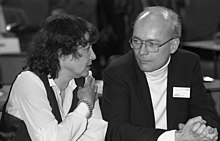Eva Rühmkorf

Eva Rühmkorf (née Titze ; born March 6, 1935 in Breslau ; † January 22, 2013 in Ratzeburg ) was a German psychologist and politician ( SPD ). In Schleswig-Holstein she was Minister for Education, Science, Youth and Culture from 1988 to 1990 and Minister for Federal Affairs and Deputy Minister-President Björn Engholm from 1990 to 1992 .
Life
After graduating from high school , Eva Rühmkorf studied psychology , theology and German studies in Marburg and Hamburg , which she completed in 1961 as a psychologist. She then worked as a market researcher for various advertising agencies until 1969 . During her studies she was a member of the SDS and took an active part in the campaign against rearmament in the Federal Republic of Germany.
In 1968 she joined the judicial authorities of the Free and Hanseatic City of Hamburg. Here she worked as a policy advisor in the penal system until 1973 and then until 1978 as the scientific director of the Vierlande juvenile prison in Hamburg-Bergedorf, which was newly established in 1970 . When Helmut Schmidt became Federal Chancellor, Rühmkorf resigned all functions in the Hamburg SPD and considered leaving. Because of Schmidt's attitude during the debate about nuclear energy , in particular the construction of the Brokdorf nuclear power plant , and his pro-American foreign policy, which Rühmkorf viewed as endangering peace, she was one of his party opponents.
In January 1979, Eva Rühmkorf became Germany's first equal opportunities officer as the head of the newly founded Hamburg “Leitstelle Gleichstellung der Frau” ;
Before the federal election in 1983 , she was part of the advisory group to the chancellor candidate Hans-Jochen Vogel and, in the event of an election victory, was supposed to occupy the position of representative for equality in the Chancellery. In the same year she was appointed State Councilor in Hamburg .
On May 31, 1988 Björn Engholm appointed her to his first cabinet as Minister for Education, Science, Youth and Culture of Schleswig-Holstein . During her tenure, u. a. A new school law and a new university law were passed, offers for a voluntary tenth school year at secondary schools and for school integration expanded and the comprehensive school became a regular school . In 1990 there was a rochade with Minister Marianne Tidick . On June 1, 1990, this took over the education department and Eva Rühmkorf took over the ministry for federal affairs. At the same time she was also appointed Deputy Prime Minister. After the state election in 1992 , she left the state government on May 5, 1992.
From 1999 to 2001 she was national chairwoman of Pro Familia (Germany) .
She was one of the first women to make politics her profession and described herself as a left-wing social democrat, pacifist and feminist .
Eva Rühmkorf was married to the writer Peter Rühmkorf (1929–2008) since 1964 . She died in a hospital in Ratzeburg. Her urn grave is located in the main cemetery in Altona .
Publications
- Who is down, also falls deep. Causes of Juvenile Delinquency . Beltz Verlag, 1977, ISBN 3-407-84010-1
- (Ed. Together with Marita Haibach , Mechthild Immenkötter and others): Women are not second class. Women's policy for equality. VSA-Verlag, Hamburg 1986.
- Ornithology. Hans-Jochen Vogel on the occasion of his 60th birthday.Collected by Eva Rühmkorf, Ed .: Board of the SPD, 1986.
- Behind walls and facades. Memories of a committed woman. Fischer-Taschenbuch, 2000, ISBN 3-596-14549-X .
- together with Ute Vogt , moderated by Jürgen Leinemann and Horand Knaup: We are the better. Strong women and politics. DVA, 2002, ISBN 3-421-05606-4 .
Honors
- " Woman of the Year " 1985, honorary award of the German Citizens' Association e. V.
- “ Hammonia Prize” 2010, award from the State Women's Council Hamburg for their commitment to women and equality
- In the Hamburg new development area "Mitte Altona" a street is named after Eva Rühmkorf.
Web links
- Literature by and about Eva Rühmkorf in the catalog of the German National Library
- Eva Rühmkorf in the Schleswig-Holstein state parliament information system
- Eva Rühmkorf - Former Chair of Pro Familia in conversation with Isabella Schmid . In: BRα forum on October 27, 2000 (protocol of the broadcast)
Individual evidence
- ↑ The date of death follows the information on the tombstone. In contrast to this, the state parliament information system in Schleswig-Holstein names January 21, 2013 as the date of death.
- ↑ E. Rühmkorf, U. Vogt, J. Leinemann, H. Knaup: We are the better ones. Strong women and politics , 2002, pp. 71–72
- ↑ Insa Gall, Eva Eusterhus: With diplomacy against antiquated role models . In: Die Welt , March 7, 2009
- ↑ Trio and Quartet , Spiegel No. 4, January 24, 1983
- ^ Sabine Etzold: Storms in the far north . In: Die Zeit , No. 21/1990
- ↑ Sabine Etzold: Timeline (PDF; 367 kB). In: Pro Familia Magazin , 1/2012, p. 5
- ↑ self-disclosure. In: Radio broadcast wdr5 on January 11, 2009, 7.05–7.30 p.m .: Experienced stories ( Memento from December 18, 2008 in the Internet Archive ) (available as a podcast)
- ↑ ln-online.de January 23, 2013; Obituary notice . In: Kieler Nachrichten , January 26, 2013
- ↑ Website of the State Women's Council Hamburg: Projects; Hammonia ( Memento from February 23, 2016 in the Internet Archive )
| personal data | |
|---|---|
| SURNAME | Rühmkorf, Eva |
| ALTERNATIVE NAMES | Titze, Eva (maiden name) |
| BRIEF DESCRIPTION | German psychologist and politician (SPD) |
| DATE OF BIRTH | March 6, 1935 |
| PLACE OF BIRTH | Wroclaw |
| DATE OF DEATH | January 22, 2013 |
| Place of death | Ratzeburg |


